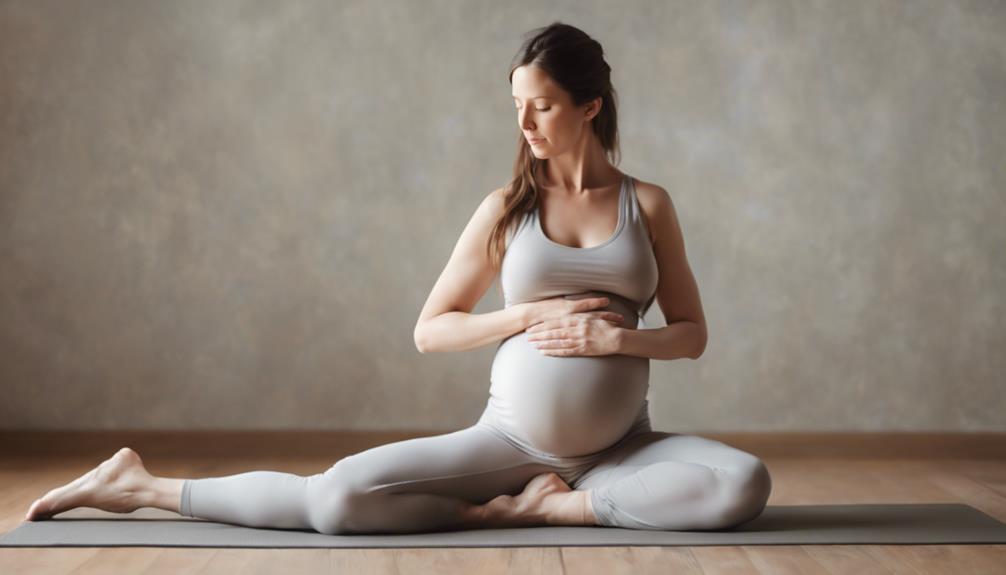Ever curious about why, during the third trimester of pregnancy, it feels like you need to urinate all the time, yet hardly anything is expelled?
We've identified ten reasons that could shed light on this common occurrence. From hormonal changes to bladder compression, each factor plays a role in this frustrating sensation.
Stay tuned to uncover the insights behind this perplexing symptom and how to navigate through it during this critical stage of pregnancy.
Key Takeaways
- Hormonal changes like relaxin and progesterone affect bladder function in the third trimester.
- Bladder compression due to the baby's growth and position contributes to the urge to pee.
- Understanding baby's position helps manage bladder discomfort and pressure.
- Implement coping strategies like Kegel exercises and fluid monitoring for bladder control.
Hormonal Changes
Experiencing hormonal changes in the third trimester can greatly impact bladder function, leading to increased pressure and the frequent urge to pee. During this time, the hormone relaxin, which aids in preparing the body for childbirth, plays a vital role. While relaxin helps loosen ligaments and joints for labor, it can also relax the bladder muscles, contributing to the urge to urinate more frequently. As the baby continues to grow, taking up more space in the abdomen, the bladder's capacity diminishes, necessitating more trips to the bathroom.
Additionally, the rise in progesterone levels during pregnancy boosts blood flow to the kidneys, resulting in increased urine production and exacerbating the urge to pee. These hormonal fluctuations can also affect the coordination between the bladder and pelvic floor muscles, potentially causing the feeling of needing to urinate even when the bladder isn't full. Understanding these changes can help expectant mothers navigate the discomfort associated with frequent urination during the third trimester.
Bladder Compression
As the baby grows in the third trimester, it can put pressure on the bladder, making it challenging to hold a significant amount of urine. This compression, coupled with hormonal changes, contributes to the frequent urge to urinate but only passing small volumes.
Additionally, the baby's position as it descends lower in the pelvis can further compress the bladder, intensifying the sensation of needing to pee.
Pressure on Bladder
Feeling the constant pressure on your bladder from the expanding uterus in the third trimester can lead to the urge to urinate frequently, often resulting in limited urine output. The growing uterus exerts pressure on the bladder, causing it to be compressed and reducing its capacity to hold urine.
This bladder compression can make it difficult to fully empty the bladder, leading to the need for frequent trips to the bathroom with only small amounts of urine being released. As the uterus occupies more space in the pelvic region, the discomfort and sensation of needing to urinate persist, even if the bladder isn't full.
To manage this, adjusting positions to relieve bladder pressure and ensuring adequate hydration while monitoring urine output can help alleviate these symptoms.
Hormonal Changes
With hormonal changes in pregnancy, the increased blood flow to the pelvic area can lead to the compression of the bladder by the growing uterus. This compression often results in feelings of urinary frequency and urgency, coupled with the frustration of incomplete emptying.
As our bodies adapt to the demands of the third trimester, hormones like progesterone and relaxin play a role in relaxing the pelvic muscles, potentially impacting bladder control. The pressure on the bladder continues to intensify as the baby grows, further exacerbating the urge to urinate while only passing a small amount of urine.
Understanding the intricate interplay between these hormonal shifts and physical changes is crucial for managing the discomfort of feeling the need to pee frequently but experiencing minimal output during this stage of pregnancy.
Baby's Position
During the third trimester of pregnancy, the position of the baby can exert increased pressure on the bladder, leading to compression and a heightened sensation of needing to urinate. As the baby's head or body presses against the bladder, it can impact the bladder's capacity to fill and empty properly, causing a frequent urge to pee with minimal output.
Particularly as the baby descends lower into the pelvis in preparation for childbirth, the pressure on the bladder intensifies. This increased pressure on the bladder due to the baby's position can also strain the pelvic floor muscles, contributing to the feeling of urgency to urinate.
Understanding how the baby's position affects bladder function can help expectant mothers navigate the discomforts of the third trimester.
Increased Blood Flow

As our bodies adapt to pregnancy, the increased blood flow plays a significant role in the urge to pee more frequently.
The expanding blood vessels and higher fluid production put extra strain on the kidneys, leading to more urine in the bladder.
This heightened pressure, compounded by the growing uterus pressing on the bladder, can make the need to urinate in small amounts a common occurrence.
Blood Vessel Expansion
Due to increased blood vessel expansion in the third trimester of pregnancy, a higher volume of blood flows to the pelvic area, impacting bladder function. This expansion places pressure on the bladder, resulting in a frequent urge to pee but often with minimal urine output. It's a normal physiological change during this stage of pregnancy.
The expanded blood vessels can compress the bladder, leading to the sensation of needing to urinate more frequently. Understanding how blood vessel expansion influences bladder function is important for pregnant individuals dealing with the urge to pee but little comes out in the third trimester.
Managing this symptom involves recognizing the role of increased blood flow and its effects on bladder pressure.
Pressure on Bladder
The increased blood flow to the pelvic area during the third trimester exerts additional pressure on the bladder, causing a heightened urge to urinate. This pressure on the urinary tract is exacerbated by the growing fetus, leading to a frequent urge to pee even when only a small amount is passed. Hormonal changes in pregnancy can reduce bladder capacity, contributing to the need to urinate more often. As the baby grows, the bladder may not empty completely despite the urge to pee. It's essential to be mindful of any signs of infection during this time. Below is a table summarizing the factors affecting the urge to pee in the third trimester:
| Factors | Impact |
|---|---|
| Hormonal changes | Reduced bladder capacity |
| Fetal growth | Pressure on bladder, frequent urge to pee |
| Increased blood flow | Heightened urge to urinate |
Growing Uterus Pressure
Feeling the constant need to urinate in the third trimester is often attributed to the increasing pressure exerted by the growing uterus on the bladder. As the uterus expands to accommodate the growing baby, it puts significant pressure on the bladder, leading to a constant urge to urinate and frequent trips to the bathroom. This pressure can also reduce the bladder's capacity to hold urine, causing incomplete bladder emptying and the sensation of needing to pee even when only a small amount is released.
The discomfort caused by the growing uterus pressing on the bladder can be challenging to manage, but a common issue experienced by many pregnant individuals in late pregnancy. Understanding the physical effects of this pressure on the bladder can help expectant parents navigate this stage with more ease. Staying hydrated while being mindful of the increased frequency of urination due to the growing uterus's pressure on the bladder is crucial.
Urinary Tract Infections (UTIs)
Experiencing a persistent urge to urinate, especially coupled with minimal urine output, may indicate the presence of Urinary Tract Infections (UTIs) in the third trimester of pregnancy. UTIs are quite common during pregnancy due to hormonal changes and the increased pressure on the bladder from the growing uterus.
Along with the urge to pee, symptoms of UTIs can include a burning sensation while urinating, cloudy or bloody urine, and pelvic discomfort. It's critical to address UTIs promptly as untreated infections can progress to kidney infections, posing more serious health risks.
If you find yourself facing the urge to pee but only producing small amounts of urine, it's important to consult your healthcare provider. They can evaluate your symptoms, perform necessary tests, and provide appropriate treatment to manage UTIs effectively during pregnancy. Seeking early intervention can help prevent complications and guarantee both your health and the well-being of your baby are safeguarded.
Overactive Bladder

During the third trimester of pregnancy, individuals may encounter a heightened frequency of urges to empty their bladder due to overactive bladder, a common condition influenced by the pressure exerted by the growing fetus and hormonal shifts. Overactive bladder can lead to a persistent urge to pee, even when the bladder contains only small amounts of urine. This frequent need to urinate can be disruptive and uncomfortable, impacting daily activities and sleep. The pressure on the bladder from the expanding uterus can contribute to increased bladder sensitivity and involuntary contractions, exacerbating the urge to urinate frequently.
Managing overactive bladder during the third trimester may involve lifestyle adjustments such as monitoring fluid intake, avoiding bladder irritants, and practicing pelvic floor exercises to support bladder function. It's essential for pregnant individuals experiencing these symptoms to consult their healthcare providers for guidance and support. Understanding the underlying causes of overactive bladder and implementing strategies to alleviate the symptoms can help improve comfort and quality of life during this stage of pregnancy.
Pelvic Floor Weakness

Pelvic floor weakness during the third trimester can have a major impact on the sensation of needing to urinate frequently while only passing small amounts of urine. Hormonal changes in pregnancy can lead to relaxation of these muscles, affecting bladder control.
Strengthening exercises like Kegels may offer relief by toning the pelvic floor muscles and improving bladder function.
Muscle Relaxation Impact
The impact of muscle relaxation on the pelvic floor during the third trimester can lead to an increased urge to urinate despite minimal urine output due to the pressure exerted by the growing baby on the bladder. Hormonal changes in pregnancy contribute to weakened pelvic floor muscles, affecting bladder control and causing incomplete emptying. We may experience frequent urges to pee with minimal voiding as the uterus expands, further stressing the bladder. Strengthening exercises like Kegels can help improve muscle tone, enhance bladder control, and alleviate the urge to pee with little urine production.
| Impact | Symptoms | Management |
|---|---|---|
| Muscle Relaxation | Increased urge to urinate, low urine output | Kegel exercises |
| Hormonal Changes | Weak pelvic floor muscles, incomplete emptying | Pelvic floor therapy |
| Uterine Pressure | Frequent urges to pee, minimal voiding | Proper hydration |
Bladder Control Challenges
Experiencing challenges with bladder control in the third trimester often stems from pelvic floor weakness, leading to frequent urges to urinate despite minimal urine output. Pelvic floor weakness, exacerbated by hormonal changes and pressure from the growing fetus, can result in urinary incontinence. Factors contributing to bladder control challenges in the third trimester include incomplete emptying of the bladder due to weakened muscles.
Addressing these issues through Kegel exercises, which strengthen the pelvic floor, and seeking guidance from healthcare providers can help improve bladder control. It's essential to understand that these challenges are common during pregnancy and can be managed effectively with the right interventions.
Physical Therapy Benefits
Strengthening weakened muscles through pelvic floor physical therapy can greatly improve urinary issues experienced during pregnancy. Physical therapy focuses on exercises to enhance pelvic floor muscle tone, provide support to the bladder, and aid in better bladder control. By addressing incontinence, pelvic pain, and other pelvic floor weakness-related problems, regular sessions with a trained therapist can improve muscle function and reduce symptoms of urge to pee with minimal output. This approach not only enhances bladder control but also contributes to overall pelvic health, alleviating discomfort associated with urinary problems in the third trimester.
| Physical Therapy Benefits for Urinary Issues | |
|---|---|
| Improved Muscle Tone | Strengthening weakened pelvic floor muscles |
| Better Bladder Support | Exercises to aid in supporting the bladder |
| Enhanced Bladder Control | Techniques to improve control and reduce urge to pee |
Baby's Position
Frequent changes in the baby's position during the third trimester can have a notable impact on the pressure on the bladder, leading to an increased urge to pee despite minimal output. As the baby shifts and grows, it directly affects how it presses on the bladder, intensifying the sensation of needing to urinate even when the urine volume is limited.
- The baby's descent into the pelvis can compress the bladder, exacerbating the urge to pee frequently.
- The expanding size of the baby in the abdomen displaces organs like the bladder, contributing to the feeling of needing to urinate with minimal output.
- Variations in the baby's position influence the pressure exerted on the bladder, affecting the intensity of the urge to urinate despite passing only a small amount.
These changes are a natural part of pregnancy as the baby prepares for birth, and understanding how the baby's position impacts bladder pressure can help alleviate concerns about the urge to pee frequently with limited urine output.
Stress and Anxiety

As the pregnancy progresses, the impact of stress and anxiety on urinary patterns becomes increasingly significant, influencing the urge to urinate even with minimal output. Stress and anxiety during pregnancy can trigger frequent urges to pee by affecting the bladder muscles. Heightened stress levels can lead to increased contractions of the bladder muscles, causing a persistent sensation of needing to urinate despite minimal urine production. Hormonal changes linked to stress can also play a role in disrupting bladder function, contributing to the urge to pee without a substantial volume of urine being released.
To address these challenges, incorporating relaxation techniques into daily routines can be beneficial. Mindfulness practices, deep breathing exercises, and seeking adequate support from partners, family, or healthcare providers can help manage stress and anxiety levels. Prioritizing self-care during this time is crucial to alleviate the impact of stress on urinary symptoms. Consulting with a healthcare provider can provide further guidance on managing stress-related urinary issues effectively, ensuring both physical and emotional well-being during pregnancy.
Reduced Bladder Capacity

During the third trimester of pregnancy, it's common for the bladder to experience a reduction in its capacity due to the growth of the fetus. This reduction can lead to the feeling of needing to pee frequently but only releasing a small amount of urine. Several factors contribute to this phenomenon:
- Fetal Growth: As the baby grows, it occupies more space within the abdomen, putting pressure on the bladder and limiting its ability to expand fully.
- Hormonal Changes: Pregnancy hormones can relax the muscles of the bladder, making it harder to fully empty the bladder and causing the sensation of needing to urinate more often.
- Pelvic Pressure: The descent of the growing baby into the pelvis as the due date nears can further compress the bladder, increasing the urge to urinate while reducing the amount of urine expelled.
Understanding these changes can help pregnant women cope with the discomfort and manage their bladder habits effectively during this stage of pregnancy.
Frequently Asked Questions
Why Does It Feel Like I Have to Pee but Only a Little Comes Out Pregnant?
I empathize with the frustration of feeling like you have to pee but only a little comes out during pregnancy. It's likely due to the pressure from your growing uterus, hormonal changes, baby's position, or even a UTI.
Why Do I Feel Like I Have to Pee After I Already Peed Third Trimester?
In the third trimester, feeling the need to pee again after just going can occur due to the uterus pressing on the bladder, hormonal shifts causing bladder fullness, weakened pelvic muscles, increased pelvic blood flow, and the baby's position adding pressure.
Why Do I Keep Having to Pee but Only a Little Comes Out?
Feeling the urge to pee often but only a little comes out in the third trimester can be frustrating. The pressure from the baby and hormonal changes can lead to this sensation. Staying hydrated but limiting fluids before bed may help.
Is It Normal to Pee a Little in Third Trimester?
Yes, it's normal to experience peeing only a little in the third trimester due to the pressure on the bladder from the growing uterus. Hormonal changes and baby's position can also play a role. Consulting a healthcare provider can offer reassurance.
Conclusion
To sum up, experiencing the urge to pee but little coming out during the third trimester of pregnancy can be attributed to a variety of factors. It's important to seek medical advice for proper management and relief.
Just like a delicate dance between the baby's weight pressing on the bladder and hormonal changes affecting bladder muscles, understanding these reasons can help pregnant individuals navigate this common discomfort with grace and ease.










